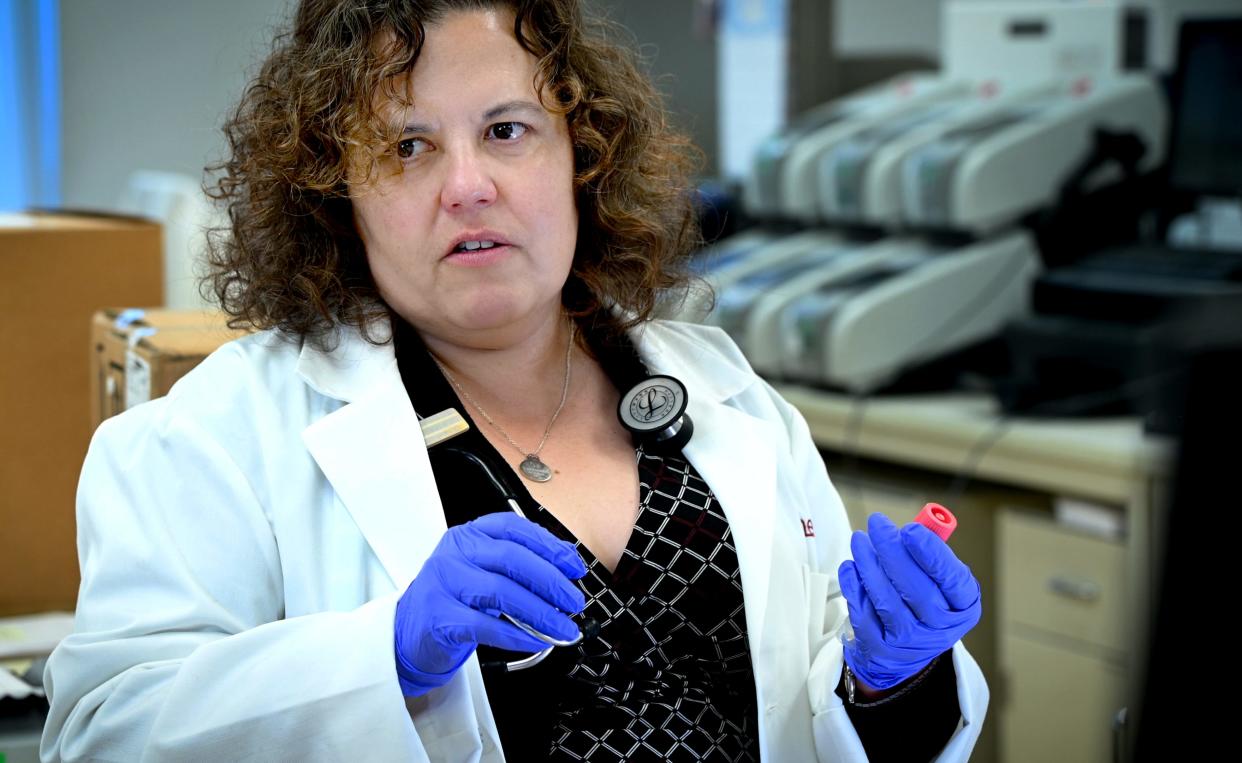COVID, flu cases on the rise in Northern Colorado after holiday season

The holidays are behind us, but the aftermath just won't leave us be.
Cases of COVID-19, the flu and respiratory syncytial virus, known as RSV, are all on the rise in Colorado after people traveled and gathered during the holidays, helping infections spread.
As of Monday, UCHealth hospitals from Colorado Springs to Fort Collins were treating 75 patients with the flu, 82 with COVID and 47 with RSV, a respiratory illness that can be deadly in children and older adults.
Add to that rhinovirus, which causes the common cold, and norovirus, better known as the stomach flu, and there's lots of misery out there.
"It's all the nasty things all at once," Barron said. Still, "it's probably the most typical respiratory season we've had in a long time. COVID is now just one of the players. It is part of the fabric of our lives now."
The Centers for Disease Control and Prevention listed Colorado as one of 21 states with very high flu activity levels at the end of December.
Until Monday, the flu was the leading cause of hospitalizations at UCHealth, said Dr. Michelle Barron, senior medical director of infection prevention and control. COVID took the lead on Monday, but the level of hospitalizations and deaths are nowhere close to what they were at the peak of the pandemic, she said. "We're not seeing the same magnitude of hospitalizations we saw prior and we're not seeing the same magnitude of death," she said. "Those are wonderful things."
However, it is leading to a false sense of security, Barron said. "When we stopped talking about it, it gave people the idea it was ... something we didn't have to worry about."
And that has led to a lower percent of people getting vaccinated against flu, COVID and RSV.
"It's kind of like hear no evil, see no evil, speak no evil," Barron said.
"Complacency is what worries me the most. These are still preventable diseases, and they can still make you pretty sick," she said, encouraging people to get vaccinated and also to get tested if they are sick. "There are treatments (for COVID and flu) that are very effective. They won't keep you from feeling sick for a few days, but they will keep you out of the hospital."
There is no treatment for RSV, but getting tested lets you know you need to stay away from young children who are very vulnerable to RSV and can end up in the hospital, she said.
This year, three vaccines are expected to provide protection against COVID, the flu and, for the first time, RSV, although the uptick for the RSV vaccine has been slow. "There is so much focus on COVID, people forget about other things," Barron said.
In adults, RSV can cause bronchitis and pneumonia in individuals who are older or have underlying lung disease like asthma or COPD (chronic obstructive pulmonary disease) or have compromised immune systems due to medications or underlying conditions.
Nirsevimab, a new monoclonal antibody treatment designed to protect infants and young children at risk from severe RSV, was approved by the Food and Drug Administration for use beginning in 2023. It provides protection for at least five months, but immune protection will wane over time, according to the CDC.
All infants younger than 8 months who are born during — or entering — their first RSV season should receive one dose, Barron said. The CDC recommends children between 8 and 19 months who are at increased risk of severe RSV disease get a dose at the start of their second RSV season.
For COVID, medications like Paxlovid and Remdesivir are still available and have been proven to be effective in lowering the risk of severe infection, according to UCHealth.
"Nobody wants to be sick and that's a good thing,” Barron said.
RSV Symptoms
Symptoms of RSV can range from mild to severe and can include cough, runny nose, fever, wheezing, decreased appetite, sneezing and congestion. In babies younger than 6 months, the only RSV symptoms they may show are irritability, decreased activity or appetite, and difficulty breathing.
COVID-19/flu symptoms
COVID-19 symptoms can look similar to that of the flu — headache, runny nose, body aches, fever, cough and a sore throat. If symptomatic, it is important to still get tested to determine what virus you have and what treatment options are best.
Ways to stay healthy
Coloradans can help reduce transmission of RSV, the flu and COVID in several ways:
Stay home when you are sick, including not visiting or interacting with people who may be at higher risk, including older adults, young children and infants.
Frequently wash your hands with soap and water or use an alcohol-based hand sanitizer with at least 60% alcohol.
Cover your nose and mouth with a tissue or upper-arm sleeve when you cough or sneeze.
Clean potentially contaminated surfaces, like doorknobs, tables, handrails, etc.
Avoid sharing cups, eating utensils and touching your face with unwashed hands.
If your child is demonstrating early signs of respiratory distress, consider taking them to their primary care doctor for evaluation.
Wear a mask at the airport when standing in lines, waiting at your gate to board the plane.
This article originally appeared on Fort Collins Coloradoan: COVID, flu cases on the rise in Northern Colorado after holiday season

